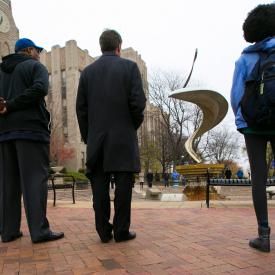Organizing for Justice and Solidarity in the 21st Century


Audience: Anyone interested in effecting change within their organization or the community at large.
Method: Online
Duration: 15 weeks
Cost: $2,781
Graduate application: Not required
Credits: 3 credits
The Structural Injustice course provides a key foundation for this class and is a prerequisite, though it may be waived depending on prior courses or experience. Please contact us with any questions.
ORGANIZING FOR SOCIAL CHANGE
To help form a more just world, it’s important to examine structural injustices and develop strategies for dismantling them. The Organizing for Justice and Solidarity in the 21st Century class builds on Creighton’s Structural Injustice course, offering insights, strategies, and skills for how to take action to address systemic injustice through individual action and social movements. The course emphasizes how individuals, through civic organizing, can initiate and influence system-level transformation.
Sign up to explore how relationships, social networks, and justice and solidarity drive social change. You’ll be introduced to and practice civic organizing skills, including dialogue, stories and the arts. Students explore emerging governance strategies, deliberative democracy and collaborative governance.
OBJECTIVES
By the completion of the course, students will:
- Consider social systems as complex adaptive systems and the dynamics of social systems as characteristics of complexity
- Explore the role of relationships, social networks and stories in social movements and system change
- Reflect on how justice and solidarity manifest in institutions and social structures
- Identify strategies for social change that are grounded in seeing social systems as complex adaptive systems
- Practice and reflect on relational civic organizing in the context of their own social networks through active listening, story creation and one-on-ones
- Become familiar with bottom-up, systems-based social movement strategies including dialogue, stories and the arts
- Consider existing governance innovations that respond to complex adaptive system dynamics
- Discover systems-based approaches to governance and to structural justice and solidarity.
WHAT TO EXPECT
This course is largely asynchronous, though there will be 10 synchronous 1.5-hour Zoom sessions. During the course, you’ll read five required books (see below), which you’ll need to purchase, plus other materials made available electronically through the Creighton library. You’ll be expected to contribute to online discussion forums weekly, complete related assignments and complete a project designed to introduce you to the skills of civic organization. For the project, you’ll plan and engage in a series of conversations with individuals outside the class.
COURSE CREDIT
This is one of the elective courses within the Master of Science in Negotiation and Conflict Resolution, and it’s worth 3 credits. The course can be taken independently as a professional development course or as part of the degree program. Please note that students are limited to earning a maximum of nine graduate credits before applying for admission into a degree or certificate program. If you are below the nine-credit limit and are not currently seeking a certificate or degree, you’re free to take this course without applying to the graduate school.
Creighton University will issue a 1098-T by January 31 for all learners enrolled in courses for credit. As part of that process, you may be asked to provide your Social Security number.
MEET THE COURSE INSTRUCTORs
This online course is taught by Palma Strand, JD, LLM and Jacqueline N. Font-Guzmán, PhD, JD, MHA.
Strand is Professor of Law and Director of Creighton University’s 2040 Initiative in the Negotiation and Conflict Resolution (NCR) Program, Department of Interdisciplinary Studies. In her teaching and research, Strand focuses on “issues that arise at the juncture of legal structures, cutting-edge conflict engagement and governance processes, and important current equity issues, especially those that related to race and gender.” See her full biography.
Dr. Jacqueline N. Font-Guzmán is professor of law and conflict studies, and director in the Negotiation and Conflict Resolution (NCR) Program in the Department of Interdisciplinary Studies at Creighton University. She is a certified mediator and arbitrator by the Puerto Rico Supreme Court. She was a Fulbright Scholar at Carlos III University School of Law in Spain. See her full biography.
REQUIRED MATERIALS
- Steven Johnson, Emergence: The Connected Lives of Ants, Brains, Cities, and Software (2002) – ISBN: 978-0684868769
- Mark Buchanan, Nexus: Small Worlds and the Groundbreaking Theory of Networks (2003) – ISBN: 978-0393324426
- Iris Marion Young, Inclusion and Democracy (2002) – ISBN 978-0198297550
- Bessie Head, When Rain Clouds Gather (reprint ed. 2013) – ISBN 978-1478607595
- John Paul Lederach, The Moral Imagination: The Art and Soul of Building Peace (2005) – ISBN 978-0199747580
REFUND POLICY
Should you need to withdraw or cancel your registration for this class, please refer to the University Policy on cancellations and refunds.
Questions?
If you have questions about the course, we’re happy to help. We can also provide assistance with group registration or work with you to develop a customized course for a team.